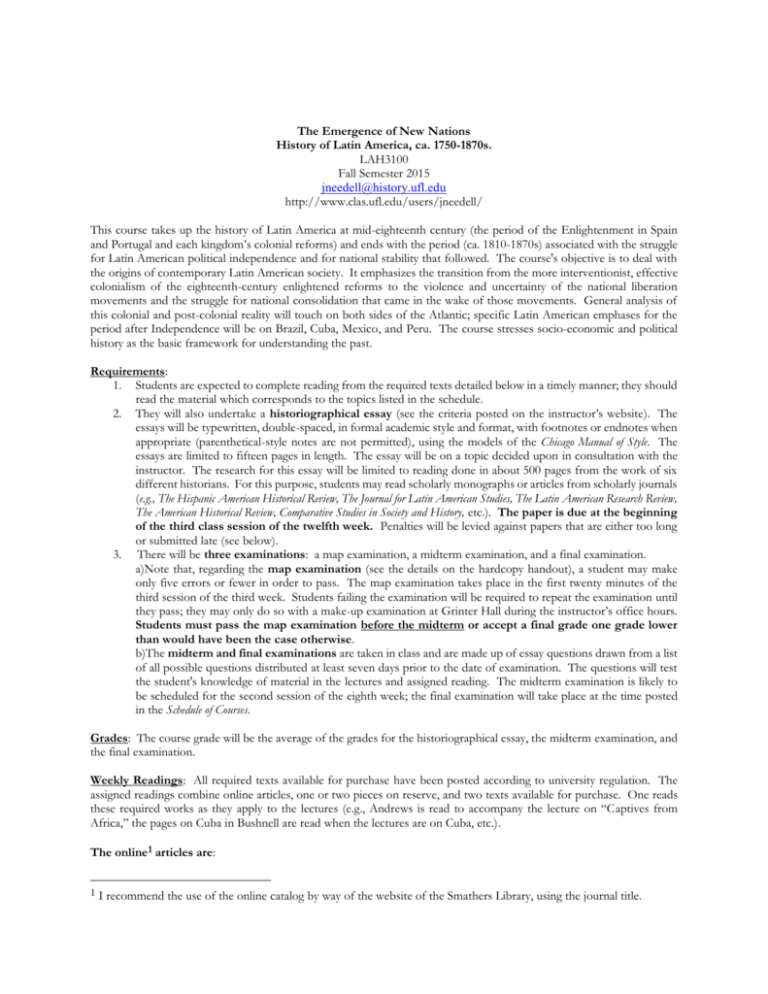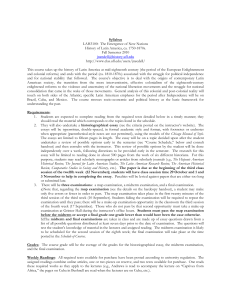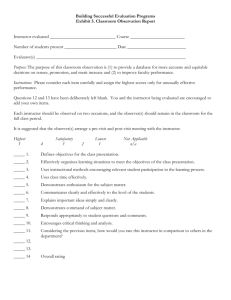LAH3100 - CLAS Users
advertisement

The Emergence of New Nations History of Latin America, ca. 1750-1870s. LAH3100 Fall Semester 2015 jneedell@history.ufl.edu http://www.clas.ufl.edu/users/jneedell/ This course takes up the history of Latin America at mid-eighteenth century (the period of the Enlightenment in Spain and Portugal and each kingdom’s colonial reforms) and ends with the period (ca. 1810-1870s) associated with the struggle for Latin American political independence and for national stability that followed. The course's objective is to deal with the origins of contemporary Latin American society. It emphasizes the transition from the more interventionist, effective colonialism of the eighteenth-century enlightened reforms to the violence and uncertainty of the national liberation movements and the struggle for national consolidation that came in the wake of those movements. General analysis of this colonial and post-colonial reality will touch on both sides of the Atlantic; specific Latin American emphases for the period after Independence will be on Brazil, Cuba, Mexico, and Peru. The course stresses socio-economic and political history as the basic framework for understanding the past. Requirements: 1. Students are expected to complete reading from the required texts detailed below in a timely manner; they should read the material which corresponds to the topics listed in the schedule. 2. They will also undertake a historiographical essay (see the criteria posted on the instructor’s website). The essays will be typewritten, double-spaced, in formal academic style and format, with footnotes or endnotes when appropriate (parenthetical-style notes are not permitted), using the models of the Chicago Manual of Style. The essays are limited to fifteen pages in length. The essay will be on a topic decided upon in consultation with the instructor. The research for this essay will be limited to reading done in about 500 pages from the work of six different historians. For this purpose, students may read scholarly monographs or articles from scholarly journals (e.g., The Hispanic American Historical Review, The Journal for Latin American Studies, The Latin American Research Review, The American Historical Review, Comparative Studies in Society and History, etc.). The paper is due at the beginning of the third class session of the twelfth week. Penalties will be levied against papers that are either too long or submitted late (see below). 3. There will be three examinations: a map examination, a midterm examination, and a final examination. a)Note that, regarding the map examination (see the details on the hardcopy handout), a student may make only five errors or fewer in order to pass. The map examination takes place in the first twenty minutes of the third session of the third week. Students failing the examination will be required to repeat the examination until they pass; they may only do so with a make-up examination at Grinter Hall during the instructor’s office hours. Students must pass the map examination before the midterm or accept a final grade one grade lower than would have been the case otherwise. b)The midterm and final examinations are taken in class and are made up of essay questions drawn from a list of all possible questions distributed at least seven days prior to the date of examination. The questions will test the student's knowledge of material in the lectures and assigned reading. The midterm examination is likely to be scheduled for the second session of the eighth week; the final examination will take place at the time posted in the Schedule of Courses. Grades: The course grade will be the average of the grades for the historiographical essay, the midterm examination, and the final examination. Weekly Readings: All required texts available for purchase have been posted according to university regulation. The assigned readings combine online articles, one or two pieces on reserve, and two texts available for purchase. One reads these required works as they apply to the lectures (e.g., Andrews is read to accompany the lecture on “Captives from Africa,” the pages on Cuba in Bushnell are read when the lectures are on Cuba, etc.). The online1 articles are: 1 I recommend the use of the online catalog by way of the website of the Smathers Library, using the journal title. 2 1. 2. Maxwell, Kenneth. “Pombal and the Nationalization of the Luso-Brazilian Economy,” Hispanic American Historical Review [HAHR], 48:4. (Nov., 1968): 608-631. Stein, Stanley J. “Bureaucracy and Business in the Spanish Empire, 1759-1804: Failure of a Bourbon Reform in Mexico and Peru,” HAHR, 61:1 (Feb. 1981): 2-28. The pieces on reserve are: 1. Alden, Dauril. “Late Colonial Brazil, 1750-1808.” In Colonial Brazil, L. Bethell ed. New York: Cambridge Univ., 1987. 2. Andrews, George Reid. Afro-Latin America: 1800-2000. New York: Oxford Univ., 2004, ch.1. The texts are: 1. Bethell, Leslie ed. The Independence of Latin America. New York: Cambridge Univ., various ed. 2. Bushnell, David & Macaulay, Neill. The Emergence of Latin America in the Nineteenth Century. New York: Oxford Univ., various ed. Course Schedule: Week Topic I. The American Viceroyalty of the Braganças. II The American Realms of the Bourbons. III. Captives from Africa. IV. Impact of the Colonial Reforms V. Independence in Brazil. VI. Independence in New Spain. VII. Independence in Spanish South America. VIII. Review and Midterm Examination.2 IX. Brazil: State, Society, and Slavery. X. Brazil: The Crisis of Constitutional Monarchy. XI. Peru: The Search for Stability. XII. Peru: From Stability to War. XIII. Mexico: The Nation Divided. XIV. Mexico: From Reform to Dictatorship. XV. Cuba: A Society Made by Slavery. XVI. Cuba: The Struggle for Independence. Advice: Prudent students will note that the assigned reading, when combined with the additional reading for the term paper, demands disciplined, constant attention. It will be apparent that students who do not have a research topic worked out with the instructor by the date of the midterm risk a crisis in meeting their responsibilities. Since very few students are familiar with Latin American history, few come up with a topic quickly on their own. The instructor does not expect you to develop a term-paper topic on your own; he invites you to consult with him at your earliest possible convenience. Penalties, Catastrophes, and Warnings: 1. Please note the map examination penalty noted above. Note, as well, that there are severe penalties for missing the deadline of the term paper (it must be turned in at the beginning of the session indicated; if it is turned in during the session, it is penalized a third of a grade (i.e., a paper that would have been graded an A+ would drop to an A, a paper that would have been graded an A would drop to an A-, and so on). If the paper is turned in after the session and within the twenty-four hour period following the deadline, it is penalized a full grade; if it is turned in within the second twenty-four hour period, it is penalized two full grades; and so on). “Turned in” means delivered by hand as hard copy to the instructor; email attachments will not be graded, although they may be considered as proof of the time of completion if the is paper turned in as soon as possible afterwards. 2. 2 All components of the course must be submitted to the instructor and a grade for each component If possible, the review will occur on Monday and the midterm examination on Wednesday, so that Friday we will begin the Brazilian lectures. This is to cope with the loss of two lectures on week XIV. 3 recorded in order to earn a course grade. Thus, even students who complete everything else, but do not have a recorded grade for the map examination, or for the midterm, or for the final examinations, or for the term paper will fail the course. 3. As life has been arranged so that unexpected catastrophes occur for which even the prudent and virtuous student cannot prepare, the instructor will be willing to review student petitions for a waiver of penalty (or lessening of penalty). Such waivers will be granted at the discretion of the instructor, and are most likely to be granted in those cases in which the instructor deems that the catastrophe is credible and reliably documented. Advance warning, even the slightest, of an unexpected, oncoming change of plans is a prudent way to prepare the instructor for the possibility of mercy. 4. There is no extra credit option or possibility in this course. 5. The instructor will not tolerate cheating. The instructor will not tolerate plagiarism (the use of others’ materials without appropriate citation, credit, or permission). A student guilty of either will fail the course and the matter will be referred to, and recorded by, the appropriate university authority. 6. The instructor does not keep records of attendance. It is his assumption that adults are the best judges of their best interest in this regard. 7. Students requesting classroom accommodation because of a disability must first register with the appropriate unit of the Dean of Students’ Office. That office will provide documentation to the student who must then provide that same documentation to the instructor when requesting the appropriate accommodation. The instructor is obliged to provide other information in regard to taking the course, information on grading, the honor code, and evaluation of the instructor. Here is that information: 1. For the university’s policies with regard to grades, see: https://catalog.ufl.edu/ugrad/current/regulations/info/grades.aspx 2. Regarding university policy on matters of honor, such as cheating or plagiarism, note that the Honor Code (http://www.dso.ufl.edu/sccr/process/student-conduct-honor-code/) specifies a number of behaviors that are in violation of this code and the possible sanctions. Furthermore, you are obliged to report any condition that facilitates academic misconduct to appropriate personnel. If you have any questions or concerns, please consult with the instructor. 3. Students are expected to provide feedback on the quality of instruction in this course based on 10 criteria. These evaluations are conducted online at https://evaluations.ufl.edu. Evaluations are typically open during the last two or three weeks of the semester, but students will be given specific times when they are open. Summary results of these assessments are available to students at https://evaluations.ufl.edu.





